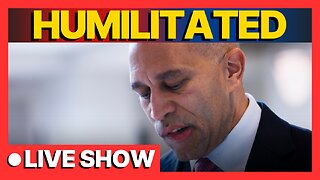Premium Only Content

The 10 amendments
James Madison introduced 12 amendments to the First Congress in 1789. Ten of these would go on to become what we now consider to be the Bill of Rights. One was never passed, while another dealing with Congressional salaries was not ratified until 1992, when it became the 27th Amendment. Based on the Virginia Declaration of Rights, the English Bill of Rights, the writings of the Enlightenment, and the rights defined in the Magna Carta, the Bill of Rights contains rights that many today consider to be fundamental to America. The First Amendment provides that Congress make no law respecting an establishment of religion or prohibiting its free exercise. It protects freedom of speech, the press, assembly, and the right to petition the Government for a redress of grievances.
The Second Amendment gives citizens the right to bear arms.
The Third Amendment prohibits the government from quartering troops in private homes, a major grievance during the American Revolution.
The Fourth Amendment protects citizens from unreasonable search and seizure. The government may not conduct any searches without a warrant, and such warrants must be issued by a judge and based on probable cause.
The Fifth Amendment provides that citizens not be subject to criminal prosecution and punishment without due process. Citizens may not be tried on the same set of facts twice and are protected from self-incrimination (the right to remain silent). The amendment also establishes the power of eminent domain, ensuring that private property is not seized for public use without just compensation.
The Sixth Amendment assures the right to a speedy trial by a jury of one’s peers, to be informed of the crimes with which one is charged, and to confront the witnesses brought forward by the government. The amendment also provides the accused the right to compel testimony from witnesses, as well as the right to legal representation.
The Seventh Amendment provides that civil cases preserve the right to trial by jury.
The Eighth Amendment prohibits excessive bail, excessive fines, and cruel and unusual punishments.
The Ninth Amendment states that the list of rights enumerated in the Constitution is not exhaustive, and that the people retain all rights not enumerated.
The Tenth Amendment assigns all powers not delegated to the United States, or prohibited to the States, to either the States or to the people.
-
 7:45:06
7:45:06
CHRONOS LEGACY MEGALITH
19 hours agoConsider Phlebas 2 - The Culture Series - Iain M Banks
83 -
 LIVE
LIVE
Barry Cunningham
1 hour agoBREAKING NEWS: PRESIDENT TRUMP MEETS WITH COMMIE MAMDANI | AND MORE NEWS!
2,562 watching -
 1:23:31
1:23:31
DeVory Darkins
2 hours agoBRUTAL moment Jeffries HUMILIATED by CNBC host regarding Obamacare
109K45 -
 1:03:10
1:03:10
The Quartering
2 hours agoThere's An OnlyFans For Pedos, SNAP Bombshell & Big Annoucement
16K32 -
 2:24:29
2:24:29
The Culture War with Tim Pool
4 hours agoMAGA Civil War, Identity Politics, Christianity, & the Woke Right DEBATE | The Culture War Podcast
177K138 -
 2:20:13
2:20:13
Side Scrollers Podcast
3 hours agoVoice Actor VIRTUE SIGNAL at Award Show + Craig’s HORRIBLE Take + More | Side Scrollers
15.5K6 -
 18:01
18:01
Bearing
8 hours agoThe Rise of DIGISEXUALS 🤖💦 Humanity Is Finished
1.55K18 -
 LIVE
LIVE
Jeff Ahern
1 hour agoFriday Freak out with Jeff Ahern
103 watching -
 1:59:21
1:59:21
The Charlie Kirk Show
3 hours agoCreeping Islamization + What Is An American? + AMA | Sedra, Hammer | 11.21.2025
45.4K22 -
 1:08:27
1:08:27
Sean Unpaved
3 hours agoWill Caleb Williams & Bears WIN The NFC North? | UNPAVED
11.8K